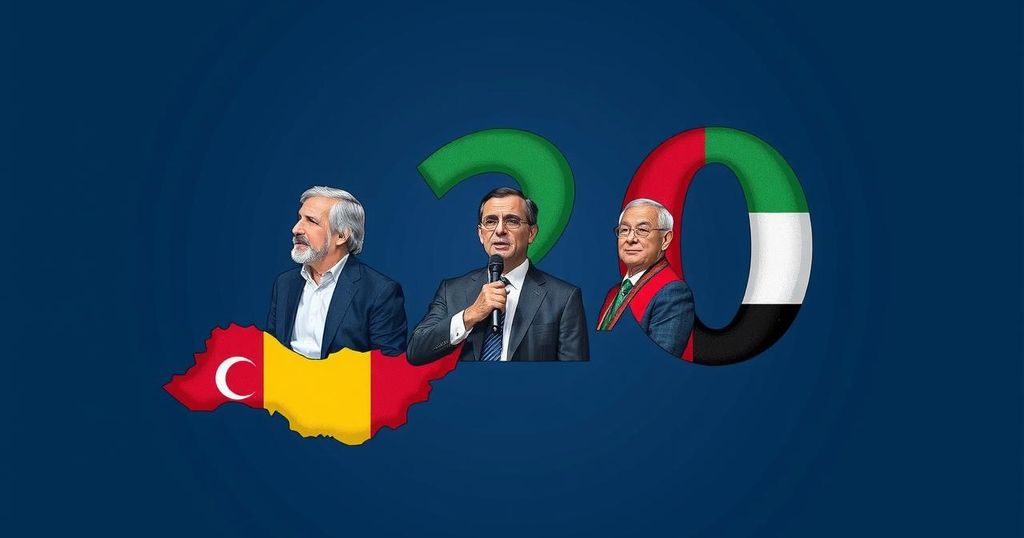World news
ASIA, BRAZIL, DIPLOMACY, ECONOMIC FORUM, EUROPE, EUROPE/ASIA, G20, GAZA, GAZA STRIP, GOLAN HEIGHTS, INTERNATIONAL RELATIONS, ISRAEL, KYIV, LEBANON, LUIZ INACIO LULA DA SILVA, LULA, MILITARY SUPPORT, MODERN ART MUSEUM, NORTH AMERICA, RIO DE JANEIRO, RUSSIA, RUSSIA-UKRAINE WAR, SERGEY LAVROV, SOUTH AMERICA, UKRAINE, UN, UNITED NATIONS, UNITED STATES, US, VLADIMIR PUTIN, WAR, WASHINGTON, WHITE HOUSE
Oliver Grayson
0 Comments
G20 Leaders Advocate for Ceasefires and Cooperation on Global Issues
Leaders at the G20 summit in Brazil called for comprehensive ceasefires in Gaza and Lebanon, emphasizing the need for cooperation on poverty reduction and climate change. Brazilian President Lula underscored that poverty is a result of political choices. Discussion included support for Ukraine and addressing humanitarian crises while noting Argentina’s dissent on several points. The summit concluded with a commitment to tackle these pressing global issues, despite lacking concrete climate financial commitments.
At the recent G20 summit in Rio de Janeiro, leaders from the world’s major economies issued a call for “comprehensive” ceasefires in both Gaza and Lebanon. This plea aimed to address escalating humanitarian crises resulting from ongoing conflicts. Brazilian President Luiz Inacio Lula da Silva, who has prioritized issues of poverty and hunger, emphasized that these challenges stem from political choices rather than mere scarcity. The summit highlighted the importance of international cooperation, particularly in tackling climate change, poverty reduction, and equitable taxation of the wealthy. Leaders also addressed the situation in Ukraine, expressing support for initiatives promoting peace while condemning the use of force for territorial gain. The G20 leaders convened to reinforce multilateral dialogue amid global tensions, particularly in light of changing political dynamics in the U.S. The leaders reached a cautious agreement on the need for peace in Ukraine and reiterated their commitment to addressing humanitarian crises in the Middle East. Notably, the summit saw Brazil’s Lula advocate for a global response to extreme poverty, launching an initiative that garnered broad support from member nations. However, Argentina, under right-wing President Javier Milei, opposed certain cooperative measures. Additionally, while climate change was discussed, leaders did not achieve significant advancements in concrete funding commitments. This summit took place against a backdrop of heightened geopolitical challenges. The calls for ceasefires reflect growing international concern over conflicts in Gaza and Lebanon, where civilians continue to bear the brunt of violence. President Lula’s focus on improving living conditions and combating extreme poverty aligns with broader global efforts aimed at achieving sustainable development. Furthermore, discussions surrounding climate change finances indicate a collective recognition of the urgent need to mobilize resources for environmental action. “These challenges are not the result of scarcity or natural phenomena but the product of political decisions.” – Luiz Inacio Lula da Silva. The summit concluded with G20 leaders emphasizing the necessity for continued cooperation on multiple fronts, particularly the urgent humanitarian crises in Gaza and Lebanon. The discussions on poverty and hunger pointed to the need for systematic political changes to address these pervasive issues. While the meeting did not yield a comprehensive climate action plan, the resolution to scale up investments indicated a shared recognition of the climate challenge. The absence of definitive commitments to climate finance remains a critical concern as additional global meetings approach. In summary, the G20 summit in Brazil successfully brought attention to pressing global issues such as conflict resolution, poverty, and climate action. The unified call for ceasefires, particularly in Gaza and Lebanon, underscores a collective desire for peace and humanitarian assistance. However, divergences in national interests, exemplified by Argentina’s dissent, may pose challenges in achieving cohesive solutions moving forward.
The G20 summit, composed of the world’s largest economies, serves as a platform for discussing pressing global issues. This year’s summit took place in Rio de Janeiro and was particularly marked by heightened tensions from the conflicts occurring in Gaza and Lebanon, alongside the ongoing war in Ukraine. Leaders aimed to develop a cooperative strategy for addressing these crises and promoting sustainable development goals, especially in poverty alleviation and climate finance. Brazilian President Lula has been a strong advocate for addressing poverty and hunger as critical issues resulting from political decisions, further complicating the dialogue with differing political views among member nations.
The G20 summit effectively addressed crucial global matters, with leaders advocating for ceasefires in Gaza and Lebanon while also emphasizing the need for cooperation in combating poverty and climate change. Although significant agreements on climate finance eluded the summit, the collective acknowledgment of these issues reflects an ongoing commitment to international dialogue. The disparities among member nations, particularly regarding Argentina’s opposition, suggest that achieving consensus on political and economic solutions remains a complex challenge.
Original Source: www.aljazeera.com




Post Comment